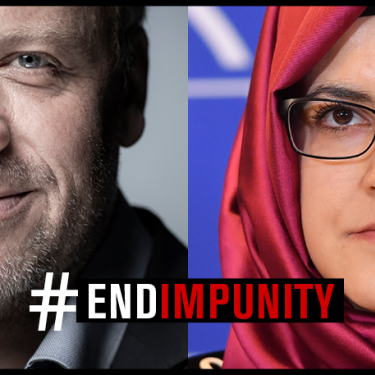International Day to End Impunity Jamal Khashoggi’s fiancée and RSF’s secretary-general appeal to G20

Hatice Cengiz, the fiancée of murdered Saudi journalist Jamal Khashoggi, and Christophe Deloire, the secretary-general of Reporters Without Borders (RSF), are appealing to the G20 on the occasion of International Day to End Impunity for Crimes against Journalists, celebrated every year on 2 November.
The appeal is about an important issue. Saudi Arabia (ranked 172nd in the World Press Freedom READ THE APPEALHEREIndex) is poised to take over the presidency of the G20, the group of countries that account for 90% of the gross world product. The G20 group photo shows the leaders of democracies but it also shows those of countries that systematically violate press freedom, such as China (177th in the Index), Turkey (157th) and Russia.
In a joint op-ed piece translated into twelve languages and will be published in countries around the world to mark International Day to End Impunity for Crimes against Journalists, Jamal Khashoggi’s fiancée and RSF’s secretary-general say: “Considerable mobilization is needed at the international level because more than 90% of these crimes go unpunished, in both countries at war and at peace.”
Cengiz and Deloire are appalled by the international community’s inertia after Jamal Khashoggi’s death inside the Saudi consulate in Istanbul, in what was a shocking state crime. Thirteen months later, the journalist’s dismembered body has yet to be found, those who instigated his murder have yet to be put on trial, and the Saudi regime continues to persecute journalists with exceptional ferocity. “At least 32 professional and non-professional journalists are arbitrarily detained in Saudi prisons,” the op-ed says.
With the G20 about to transition to a Saudi presidency, it is clear that “the sanctions adopted by Washington, Ottawa, Paris and Berlin against a handful of individuals suspected of involvement in Jamal Khashoggi’s murder have not sufficed to persuade the regime to moderate its repressive policies,” the op-ed points out, adding that just a few months ago, US President Donald Trump insisted that Mohammed bin Salman stand beside him in the front row for the group photo of the G20’s leaders during their meeting in Osaka, Japan.
After mentioning some of the other recent murders of journalists that are still unsolved and unpunished – those of Daphne Caruana Galizia in Malta, Gauri Lankesh in India, Javier Valdez and Miroslava Breach in Mexico, Jean Bigirimana in Burundi and Pavel Sheremet in Ukraine – Cengiz and Deloire issue their appeal: “The G20’s leaders have a duty to act if they want to comply with the principle of responsibility (...) Heads of state and government cannot content themselves with being the passive spectators of the murders of journalists.”
And they conclude: “Treating Saudi Arabia’s G20 presidency as a presidency like any other would be to give the Saudis a ‘licence to kill,’ to give them permission to suppress the truth and extinguish media pluralism. We call on the G20 not to trample on Jamal Khashoggi’s memory. We ask its leaders to obtain clear undertakings from Saudi Arabia to respect press freedom and, as a first step, to release its imprisoned journalists.”



